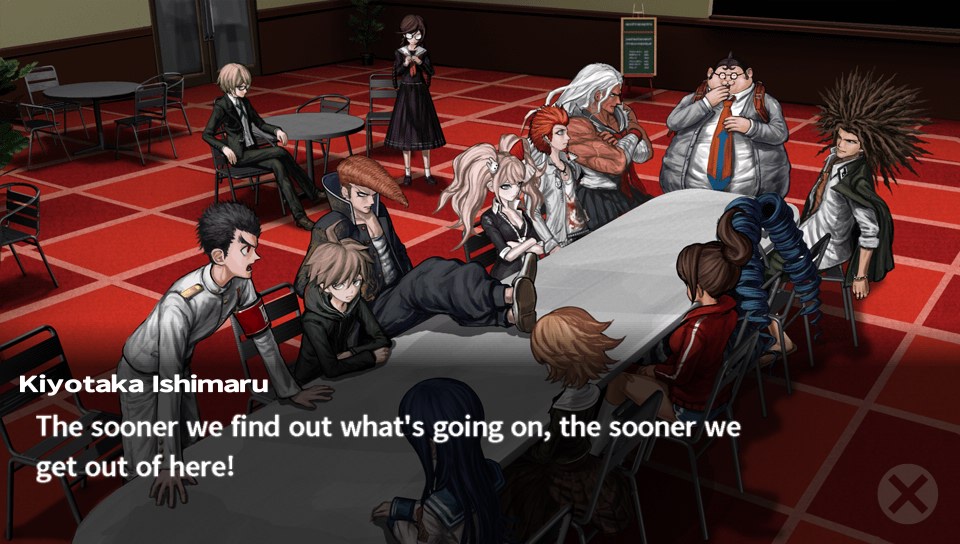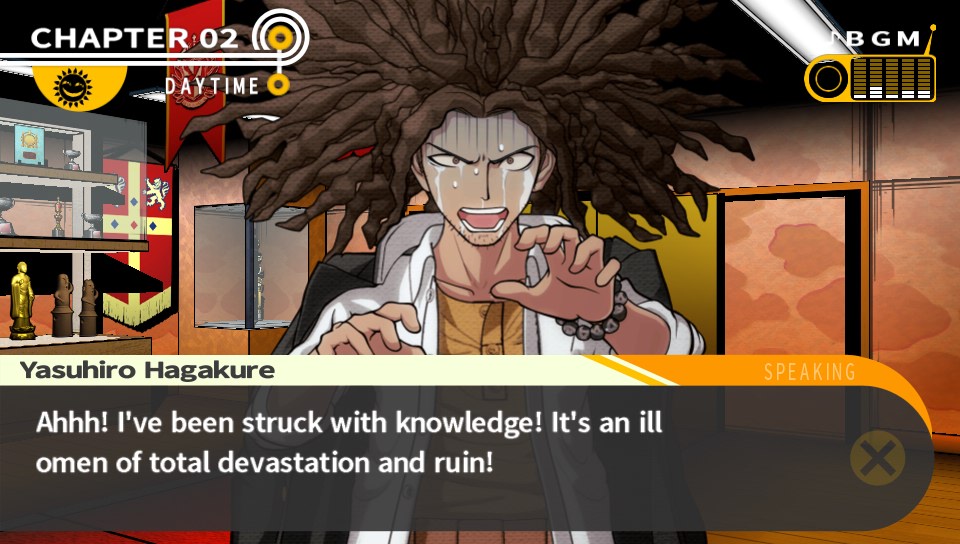Search
[{{{type}}}] {{{reason}}}
{{/data.error.root_cause}}{{{_source.title}}} {{#_source.showPrice}} {{{_source.displayPrice}}} {{/_source.showPrice}}
{{#_source.showLink}} {{/_source.showLink}} {{#_source.showDate}}{{{_source.displayDate}}}
{{/_source.showDate}}{{{_source.description}}}
{{#_source.additionalInfo}}{{#_source.additionalFields}} {{#title}} {{{label}}}: {{{title}}} {{/title}} {{/_source.additionalFields}}
{{/_source.additionalInfo}}Danganronpa: Trigger Happy Havoc (Vita)

Danganronpa: Trigger Happy Havoc
Developed by: Spike Chunsoft/NIS America
Release Date: February 11, 2014
Available on: PlayStation Vita
Genre: Adventure, Visual Novel
Number of Players: Single-Player
ESRB Rating: Mature
Price: $39.99
(Amazon affiliate link)
Danganronpa: Trigger Happy Havoc is the American release of a Japanese remake of the PSP game of the same name. In it you watch as the protagonist, Makoto Naegi, recounts the story of how he and 14 other students came to be trapped in the prestigious Hope's Peak Academy and how they're now forced to murder one another if they ever hope to escape.
Hope's Peak Academy is the institution where the best of the best, the most elite, of the Japanese youth are sent to be groomed to become the future leaders of the nation. As such every student trapped with Makoto wears an unofficial moniker to that effect: The Ultimate Baseball Star, the Ultimate Fashionista, the Ultimate Moral Compass, et al. Makoto, however, is anything but exemplary, even among the average he's average. But he gained entry via a nationwide lottery, making him the Ultimate Lucky Student.
Once all the students are gathered it's revealed that the school headmaster, as embodied by a megalomaniacal mechanical teddy bear named Monokuma, has trapped them together to participate in a perverse game: Live peaceably together in the school for the rest of their lives, or kill another student and get away with the crime to escape.
The game is split between two modes: Daily Life and Deadly Life. In Daily Life Makoto is free to explore what areas of the school he has access to (new areas are unlocked after a Class Trial is concluded) and spend time with the other students trapped with him. Spending time with students reveals more about their own stories and personalities and, if played right, unlocks either new skills or a skill point that can be utilized during the Class Trial.
Deadly Life is split into two parts: Investigation and the Class Trial. An investigation begins when three students discover a body. Makoto gets tasked with investigating the scene, gathering clues, and interviewing students. When he gathers everything he can Monokuma calls everyone together to begin the Class Trial.
During the Class Trial it is up to Makoto and the other students to figure out whodunnit and prove it. If they can successfully prove who “the blackened” is, the guilty party is summarily executed by Monokuma in some thematic way unique to their background. These executions are equal parts disturbing and theatrical.

Strong Points: Great writing, consistently unique characters, good music
Weak Points: Slow to start, player has little say in how story plays out, Class Trial gets mini-game heavy, anime tropes sometimes grating
Moral Warnings: Strong language, sexual innuendo, violent murder scenes
The class is motivated to find the real killer because their lives depends upon it. If they convict the wrong person not only is “the blackened” set free, but everyone else is executed.
The Class Trial is the only part of the game that has actual true gameplay elements; most of the game plays like a visual novel. The first and largest part of any Class Trial is the Nonstop Debate where the evidence and testimony Makoto collected provides the metaphorical ammunition he uses to prove his case. These “Truth Bullets” are used to shoot through contradictions in the testimony and opinions expressed during the trial. Sometimes Makoto may not have a bullet appropriate to address a contradiction, so he then has to absorb a portion of testimony from the trial, converting a bullet into something new, and use that new bullet to shoot down the contradiction.
I've read that the Class Trial plays a lot like a Phoenix Wright game and if you're familiar with that series you're likely to be comfortable with this part of the experience. The Class Trial introduces other methods of playing, like the Hangman's Gambit (a literal game of Hangman to recall certain details about the crime) and Bullet Time Battle that plays like a rhythm-based game where you shoot down a student's objection to a particular beat.
The Class Trial was a little mini-game heavy for my taste. The mechanics are used so infrequently as compared to what you're doing for the majority of the game that I found myself fumbling to recall what I needed to do to present my case. Maybe I needed my own Hangman's Gambit...
I was also frustrated by the limitations of what could be expressed during a debate, or even to another student in a Daily Life conversation. I've taken pains not to say “You do X” during this review unless absolutely necessary because, in order to reconcile my desire to play the game in a way that seems to me to make the most sense, versus how the game forces me to play, I don't think you, the player, actually do anything. This is Makoto's story and he's telling it to you. So if you want to do X and can't that's because, I've concluded, Makoto never did that thing.
This is a visual novel first and foremost. Remember that. You don't take it personally when the protagonist in a novel does something you think is stupid, so don't get annoyed when you feel like you're being railroaded to act a certain way. You're not. This is just Makoto relating what he did.
The game is ultimately about hope and despair. Monokuma's motivation is to create as much despair in the students as possible in an effort to get them to participate in the “Killing Game” and, we find out, to make a larger observation about life. What the game has to say about hope and despair is interesting but, from a Christian perspective, incomplete. Our hope is trusting the Lord and as such can never be taken away by any force unless we permit it. In this light Monokuma's objective has little teeth for the believer. Despair permeates Hope's Peak Academy because the students put their hope in one another and institutions.

Higher is better
(10/10 is perfect)
Game Score - 82%
Gameplay - 15/20
Graphics - 7/10
Sound - 10/10
Stability - 5/5
Controls - 4/5
Morality Score - 68%
Violence - 0/10
Language - 2.5/10
Sexual Content - 8.5/10
Occult/Supernatural - 10/10
Cultural/Moral/Ethical - 13/10
A fine thing on the surface, for we ought to build connections in trust and love, but one erected upon a shaky foundation and easily destroyed by man (or a psychotic teddy bear).
Since you're spending most of your time reading (though the voice acting during the Class Trial is top notch) the quality of the writing is very important and [i]Danganronpa: Trigger Happy Havoc[/i] doesn't disappoint. The writing is fun to read, peppy, and rarely dry. It's one of the best aspects of the game. The characters sound unique and you can't imagine them saying anything different. That's a real feat when it comes to writing dialog.
Be aware, however, that there is not infrequent salty language and sexual innuendo. If that's something you wish to avoid then this game isn't for you. In my mind it never crosses into existing for the sake to exist, and punctuates the characters who use that language well. Two or three characters speak this way because that's how the character communicates. While other characters never even approach that line.
I like that.
Since the game is primarily about solving murders there is a fair amount of violence. It's sanitized to an extent as there's no splatter of crimson across crime scenes, but a Pepto-Bismol pink instead. Yes, all blood is pink but that doesn't mean the crime scenes are any less gruesome. You may bleed like a Klingon but there's no mistaking there's a butchers knife sticking out of your torso.
Also, while you may not ever see the actual crime being committed, in the closing part of the Class Trial, you do piece the series of events together in a comic book-style series of panels as you lay out your closing argument.
Overall I did enjoy the game. Sure I wish it were more interactive, and that the time I spent with other students meant more than unlocking skills and a little bit of backstory, but the game is a visual novel and not a RPG. It's very well written for the most part (plot holes do emerge after the larger mystery of why Monokuma is doing all of this is revealed) and the Class Trial, despite being mini-game crazy, is good fun. I'm glad I purchased it and I look forward to the sequel coming out this Fall. I'll grab it day one.








